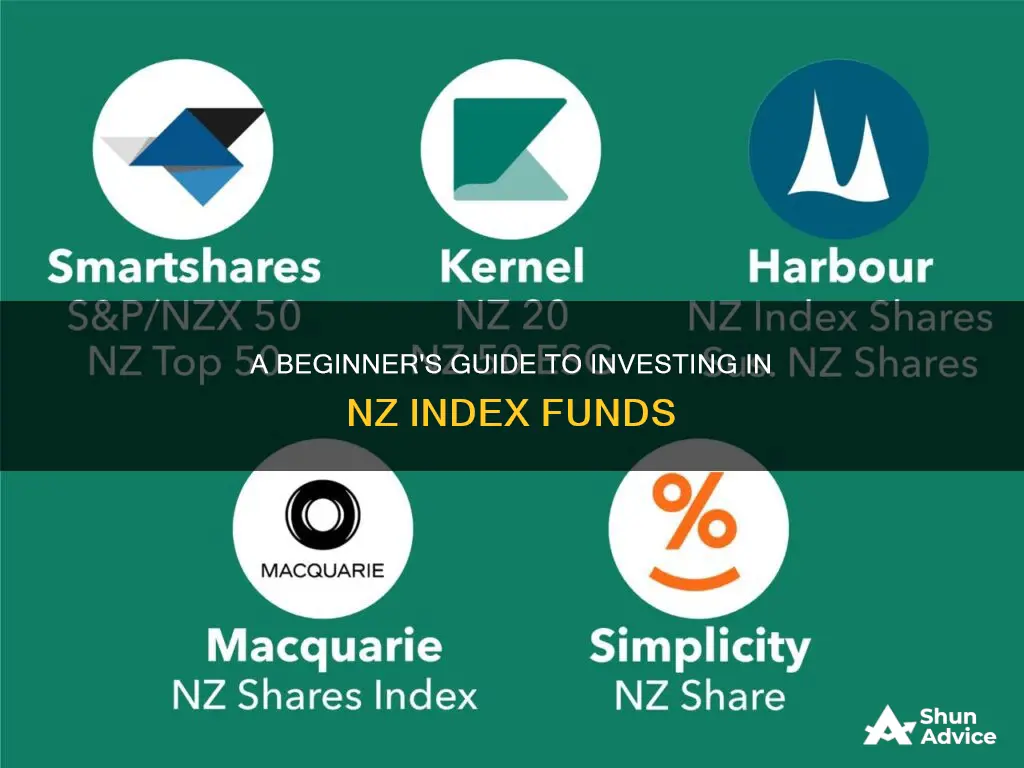
Index funds are a passive investment strategy that aims to replicate the performance of a specific market index, such as the NZ or US stock market, the international stock market, and the bond markets. Instead of trying to outperform the market, index funds seek to match its returns by investing in a diversified portfolio that mirrors the index's composition. They are a straightforward and easy-to-understand approach to investing, making them accessible to beginners. One of the benefits of index funds is that they typically have lower fees than actively managed funds as they aim to track an index rather than employing costly research and analysis. Index funds also offer instant diversification by including a broad range of stocks or other assets, reducing the risk associated with investing in individual companies or industries.
| Characteristics | Values |
|---|---|
| Definition | Index funds are investments that track an index. |
| How it works | An index fund will try to match the performance of a specific index by investing in the things on that index. |
| Comparison with actively managed funds | Actively managed funds have fund managers who pick specific investments and are therefore more expensive than index funds. |
| Advantages | Instant diversification, lower fees, accessible for beginners. |
| Access | New Zealanders can choose from a variety of index funds or ETFs that track both domestic and international markets. |
| Alignment | Many KiwiSaver providers offer index funds as an investment option. |
| Sustainable investing | Several index funds in New Zealand focus on companies with strong environmental, social, and governance (ESG) practices. |
| Taxes | The tax structure of funds that are PIEs (portfolio investment entities) is lower (maximum 28%) compared to buying investments directly. |
What You'll Learn

Index funds vs. actively managed funds
Index funds and actively managed funds are two types of mutual funds, which are investment vehicles that pool money from multiple investors to purchase a diversified portfolio of stocks, bonds, or other assets. Both types of funds have their own advantages and disadvantages, and understanding these differences can help investors make informed decisions about their investment strategies.
Index funds, also known as passive investments, aim to replicate the performance of a specific market index, such as the S&P 500 or the NZX 50. They do this by investing in the same securities and assets that make up the index, in the same proportions. This means that index funds are designed to provide returns that are similar to the overall market returns, minus a small amount for fees. Index funds are often seen as a more passive approach to investing, as they do not require active management or frequent trading. As a result, they tend to have lower fees than actively managed funds, which can lead to higher long-term returns. Additionally, index funds offer instant diversification, reducing the risk associated with investing in individual companies or industries.
On the other hand, actively managed funds employ professional money managers who actively select investments with the goal of outperforming the market. These funds aim to beat the returns of a specific benchmark or index. Actively managed funds involve more research, analysis, and trading, which leads to higher fees. While these higher fees can be a drawback, the potential upside is that skilled fund managers may be able to identify and capitalise on investment opportunities that outperform the market.
The choice between index funds and actively managed funds ultimately depends on an investor's risk tolerance, investment goals, and preferences. Index funds are generally considered a more conservative option, offering broad market exposure and lower fees. In contrast, actively managed funds may provide the potential for higher returns but also carry the risk of underperforming the market if the fund manager's investment selections do not pan out.
In summary, index funds offer a passive, low-fee approach to investing, providing returns that typically mirror the overall market. Actively managed funds, on the other hand, aim to beat the market through active security selection by professional fund managers, but this comes with higher fees and potentially higher returns or underperformance.
Choosing the Right Brokerage: Investment Funds Explained
You may want to see also

Advantages of index investing
Index investing is a popular strategy used by many worldwide, and it offers several advantages for New Zealanders looking to enter the investment market. Here are some key advantages of index investing:
- Straightforward and Accessible: Index investing is straightforward and easy to understand, making it accessible for beginners. You don't need to spend hours researching individual stocks or trying to time the market. By investing in an index fund or exchange-traded fund (ETF), you gain exposure to a broad market segment in a single investment.
- Lower Fees: Traditional actively managed funds often charge high fees for their investment expertise. In contrast, index funds typically have lower fees because they aim to track an index rather than employing costly research and analysis. By minimising fees, index investors can retain a larger portion of their investment returns.
- Instant Diversification: Index funds offer instant diversification by including a broad range of stocks or other assets. This diversification helps reduce the risk associated with investing in individual companies or industries. For example, investing in a New Zealand index fund gives you exposure to multiple companies across different sectors, mitigating the impact of poor performance from a single stock.
- Aligns with KiwiSaver Goals: KiwiSaver is a voluntary long-term savings scheme in New Zealand. Many KiwiSaver providers offer index funds as an investment option, aligning with the low-cost, diversified nature of index investing. By selecting an index fund within KiwiSaver, you can benefit from its advantages while saving for retirement.
- Exposure to Sustainable Investing: Index investing has embraced the growing trend of sustainable investing. Several index funds in New Zealand focus on companies with strong environmental, social, and governance (ESG) practices. By investing in these funds, New Zealanders can support companies that align with their values while potentially earning competitive returns.
- Access to Domestic and Global Markets: New Zealand investors can choose from a variety of index funds or ETFs that track both domestic and international markets. This provides an opportunity to diversify beyond the local market and gain exposure to global companies, industries, and economies.
Smart Money: Ultra-Short Term Funds Explained
You may want to see also

How to get started with index funds
Index funds are a passive investment strategy that aims to replicate the performance of a specific market index, such as the NZ or US stock market, the international stock market, and the bond markets. Index funds are a great way to get started with investing as they are straightforward and easy to understand. Here are some steps to get started with index funds:
Understand Index Funds
Firstly, it is important to understand what index funds are and how they work. Index funds are investments that track the performance of a specific index, such as the S&P 500 or the Dow Jones Industrial Average. These indexes are lists of investments, such as large US-listed companies or large NZ-listed companies. Index funds aim to match the performance of these indexes by investing in the same things that are on the index.
Determine Your Investor Profile
Before investing in index funds, it is important to understand your investor profile. This includes knowing your investment goals, risk tolerance, and time horizon. You can use an investor profiler tool to help you understand your investor type, which will suggest the types of funds that may be suitable for you.
Research and Compare Index Funds
There are a variety of index funds available, so it is important to research and compare different options to find the ones that align with your goals and values. Consider factors such as fees, taxes, and the types of companies or industries included in the fund. You can use online tools and platforms to compare different index funds and their performance.
Choose a Fund and Start Investing
Once you have researched and compared different index funds, you can select the fund that best suits your needs and goals. You can then start investing by purchasing units in the fund. Remember to consider the risks associated with investing and ensure you understand the fees and potential returns. You can start with a small amount of money and gradually increase your investments over time.
Monitor and Review Your Investments
Finally, it is important to regularly monitor and review your index fund investments. Keep track of the fund's performance and make adjustments as needed to ensure it remains aligned with your investment goals and risk tolerance. Remember that investing involves risk, and the value of your investments may fluctuate over time.
Maximizing Your Employee Provident Fund Investments: A Guide
You may want to see also

Passive investing vs. active investing
Passive investing, also known as index investing, is a strategy that aims to replicate the performance of a specific market index, such as the NZ or US stock market, the international stock market, and the bond markets. Instead of trying to outperform the market, passive investors seek to match its returns by investing in a diversified portfolio of investment assets that mirror the index's composition. Passive investing is straightforward and easy to understand, making it accessible for beginners. It offers instant diversification by including a broad range of stocks or other assets, reducing the risk associated with investing in individual companies or industries. Passive funds also tend to have lower fees than active funds.
Active investing, on the other hand, involves trying to beat the market by actively selecting specific investments. Active funds have fund managers who pick investments, resulting in higher fees than passive funds. Active investing can give you lower or higher returns than the market, depending on the fund manager's choices.
In New Zealand, passive investing offers access to domestic and global markets, aligns with KiwiSaver goals, and provides exposure to sustainable investing. Over the past five years, the median NZX50 Index Focussed Manager has generated a return of 17.4% per annum, while the S&P/NZX50 Index returned 16.9% per annum.
When deciding between passive and active investing, it is important to consider factors such as fees, performance, and the level of risk and diversification desired.
Explore Managed Futures Funds: Diversify Your Investment Portfolio
You may want to see also

Tracking risk
Index funds are a type of investment that tracks the performance of a market index, such as the S&P 500 or the Dow Jones Industrial Average. They are considered passive investments, as they follow a set of rules and aim to replicate the performance of a specific index rather than trying to outperform the market. This means they tend to have lower fees than actively managed funds, which employ fund managers to pick specific investments.
However, one of the risks of investing in index funds is tracking error. Tracking error refers to the divergence between the price behaviour of an investment and that of its benchmark index. It is calculated as the standard deviation of the difference between the returns of an investment and its benchmark and is expressed as a percentage. Tracking error can occur for various reasons, including transaction costs, management fees, and differences in portfolio composition compared to the index.
Tracking error is important because it provides a measure of how well an index fund is replicating its benchmark index. A low tracking error indicates that the fund is achieving its goal of mimicking the index, while a high tracking error suggests that the fund's performance is deviating from its benchmark.
When investing in index funds, it is crucial to consider the potential for tracking error and conduct thorough due diligence. Different index funds have different elements that can impact returns, such as weighting, fees, ability to track the market, and whether they are hedged or unhedged. Therefore, investors should carefully read all available information about a fund before investing, including its prospectus, shareholder report, and portfolio holdings.
Overall, while index funds offer a passive and cost-effective investment strategy, they are subject to tracking risk, which can affect their performance relative to their benchmark indexes.
A Guide to Investing in Mutual Funds
You may want to see also
Frequently asked questions
An index fund is an investment that aims to match the performance of a specific market index, such as the NZ or US stock market, or the S&P 500, which includes 500 large US-listed companies. Index funds are passive investments that follow a set of rules and tend to track the overall market movements. They are typically associated with lower fees compared to actively managed funds.
Index funds offer a straightforward, beginner-friendly approach to investing. They provide instant diversification by including a broad range of stocks or assets, reducing the risk associated with investing in individual companies or industries. Index funds also tend to have lower fees than actively managed funds as they aim to track an index rather than employing costly research and analysis.
You can start by narrowing down a few funds that align with your investment goals and comfort level. Consider factors such as diversification, risk levels, fees, and taxes. You can choose from a variety of index funds or ETFs (exchange-traded funds) that track both domestic and international markets. Remember to do your research, consult with a financial advisor, and ensure that your investment strategy aligns with your goals, risk tolerance, and timeline.







